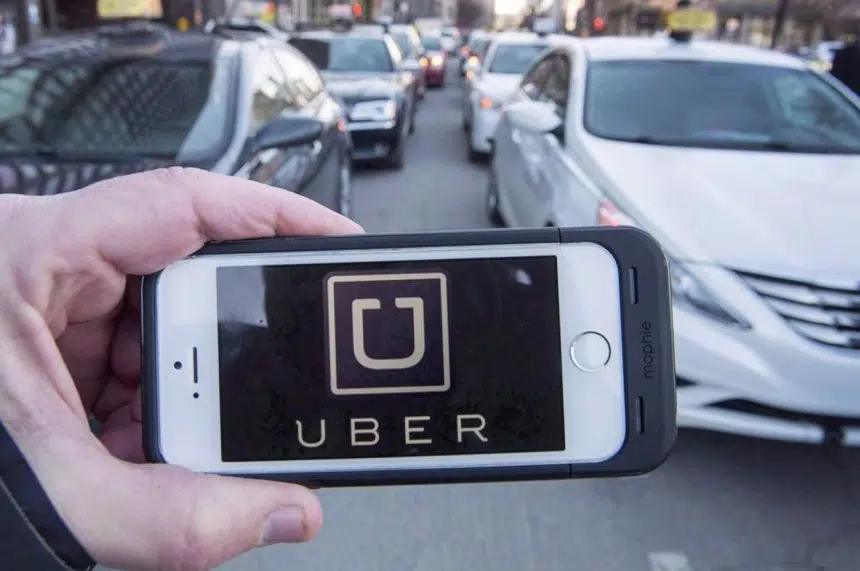Saskatoon city council discussions around ride sharing services such as Uber are going to drag on after a committee ran out of time on the issue Tuesday.
City administrators presented a preliminary plan for introducing ride sharing to the Bridge City, outlining a series of potential rules governing the new industry — and comparing them to those in the taxi business.
The city is recommending a Transportation Network Company bylaw be developed to apply to ride sharing in the short-term, while administration would also work on a more comprehensive ride-for-hire bylaw that would revamp taxi rules as well.
Among the differences between the two industries in the proposed regime:
- Ride sharing wouldn’t require an in-car camera, while taxis do
- Ride sharing base fares would start at $3.10 — taxis start at $3.75
- Only taxis would be able to stay at taxi stands and pick up street hailers
- Individual ride share drivers wouldn’t be required to get a business licence — taxi drivers must do so
- The number of ride share drivers would be unlimited, unlike taxi plates
- Peak time surge pricing would be allowed for ride sharing, not for taxis
Councillors on committee heard from more than a dozen taxi drivers and managers at the meeting, many of whom decried an “unlevel playing field” created by the rules.
“If they are coming, and when they are coming, we should make sure that the standard we have created stays where it is,” taxi driver Mubarik Syed told councillors.
City staff had consulted with the taxi industry during the development of the regulation options, but industry leaders said they were caught off-guard by a lower base fare and the elimination of in-car cameras.
“The difference on the consultation carried out by the province and SGI compared to the city is night and day,” Comfort Cabs general manager Carlo Triolo said.
He and others objected to the administration’s rationale of ride-sharing base fares being determined by the price of a city bus ticket.
“There’s a big difference between a 50-passenger bus, that we all subsidize, versus a four-passenger ride-share vehicle,” he said.
Triolo also questioned whether taxis could be considered under ride sharing rules if they just slightly adjusted their business.
“If a taxi vehicle were to only respond to app dispatch trips requested by credit card holders, would they be a taxi or an Uber-type vehicle?” he asked.
Operators also expressed frustration over the fact criminal record checks for drivers would be handled by the ride sharing service companies.
Saskatchewan Taxi Cab Association (STCA) spokesperson Shondra Boire pointed to American reports of Uber drivers being found to have convictions for murder and sexual assault, saying “common sense and a quick Google search” should convince councillors to enact more stringent security measures.
However, Uber Canada’s general manager of cities for Western Canada told the committee the company believes those issues will be eliminated north of the border because of more comprehensive police database access.
Michael van Hemmen added the Uber app has security features to ensure the safety of riders.
“You see who your driver is in advance of them picking you up — their picture and make and model of the car,” he said.
“When you’re on your way you can press the button ‘share my status’ and that will share your location and that same driver information with a family member or a loved one, which just adds layer after layer of security.”
He noted while the company would prefer no base fare be applied to them, it would continue to work with the city to bring Uber to Saskatoon.
Van Hemmen suggested taxis and ride sharing could peacefully co-exist in the city, providing different services to residents.
“In the same way that limo is different from taxi is different from car-pooling is different from ride sharing, each model has slight nuances on how it goes about doing business,” he said.
“Level and fair doesn’t have to mean exactly the same. If taxi wants to operate and expand its business model to include ride sharing, absolutely go for it. We look forward to competing.”
City councillors on the transportation committee didn’t get the opportunity to ask their own questions of administration about the recommendations, because the four-hour time limit allotted to the special meeting had expired.
However, Ward 5 Coun. Randy Donauer said he doesn’t like the position councillors are in.
“It’s not my job to eliminate competition in the city, but it’s not my job to make it unfair,” he said, noting he doesn’t want to decimate taxi drivers.
While acknowledging several taxi drivers who said they spent their life savings on a taxi plate licence — priced at $235,000 by some — Donauer noted the city didn’t create the market when they first gave out the plates.
“You want the city to offset any losses you may incur as an investor?” he asked one taxi operator.
“If you were to sell your plates for a profit, would you return some of that profit to the city?”
The driver responded by saying, “I think there’s some responsibility on your part.”
The committee will convene for a second special meeting on June 27 to discuss the city staff recommendations.
They could also vote on a proposal from the STCA to create a taxi flex fleet of part-time drivers that would operate in peak times.











